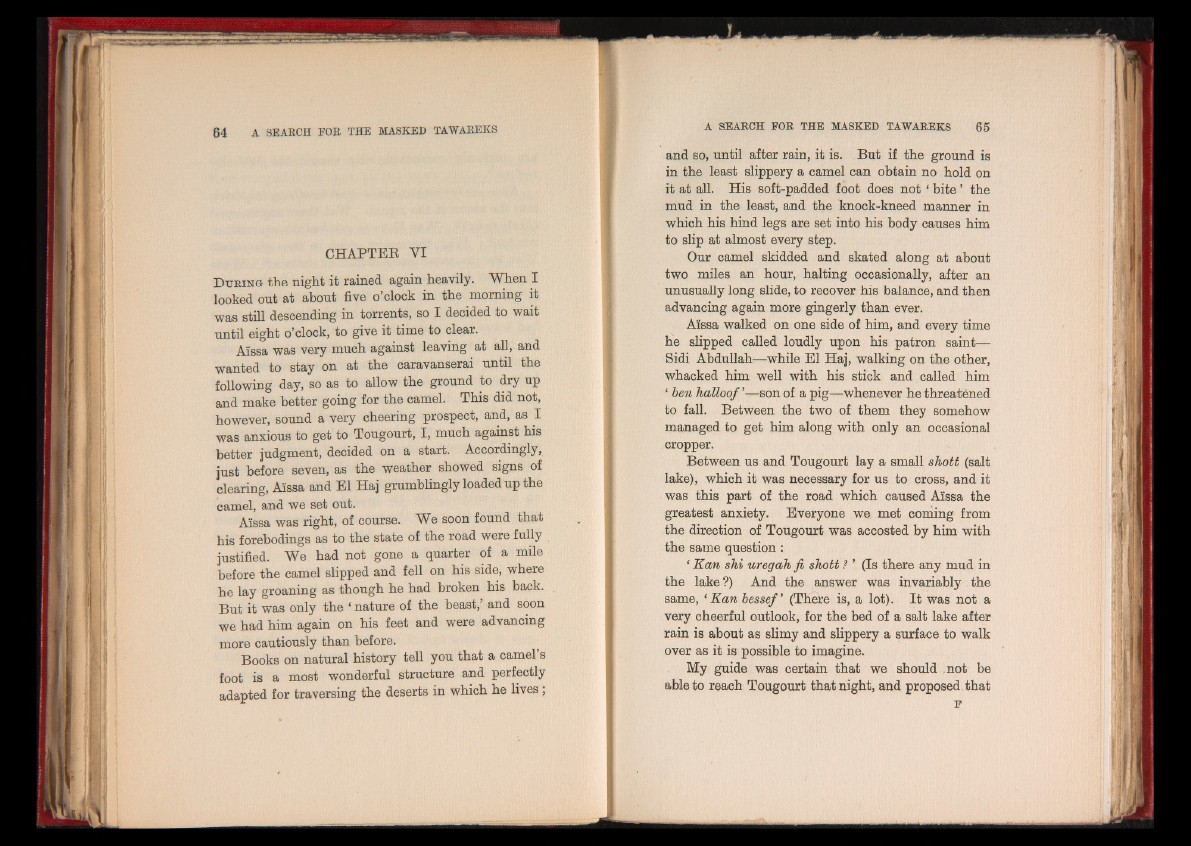
64 A SEARCH FOR THE MARKED TAWAREKS
CHAPTER VI
D uring th e nigh t it rained again heavily. W h en I
looked ont at about five o ’clock in th e morning it
was still descending in torrents, so I decided to wait
u ntil eight o ’clock, to give it tim e to clear.
Aissa was very much against leaving at all, and
wanted to stay on at the caravanserai until the
following day, so as to allow the ground to dry up
and make better going for the camel. This did not,
however, sound a very cheering prospect, and, as I
was anxious to get to Tougourt, I, much against his
better judgment, decided on a start. Accordingly,
just before seven, as the weather showed signs of
clearing, Aissa and El Haj grumblingly loaded up the
camel, and we set out.
Aissa was right, of course. We soon found that
his forebodings as to the state of the road were fully
justified. We had not gone a quarter of a mile
before the camel slipped and fell on his side, where
he lay groaning as though he had broken his back.
But it was only the ‘ nature of the beast,’ and soon
we had him again on his feet and were advancing
more cautiously than before.
Books on natural history tell you that a camel s
foot is a most wonderful structure and perfectly
adapted for traversing the deserts in which he lives;
A SEARCH FOR THE MASKED TAWAREKS 65
and so, until after rain, it is. But if the ground is
in the least slippery a camel can obtain no hold on
it at all. His soft-padded foot does not ‘ bite ’ the
mud in the least, and the knock-kneed manner in
which his hind legs are set into his body causes him
to slip at almost every step.
Our camel skidded and skated along at about
two miles an hour, halting occasionally, after an
unusually long slide, to recover his balance, and then
advancing again more gingerly than ever.
Aissa walked on one side of him, and every time
he slipped called loudly upon his patron saint—
Sidi Abdullah—while El Haj, walking on the other,
whacked him well with his stick and called him
‘ ben Jialloof ’—son of a pig—whenever he threatened
to fall. Between the two of them they somehow
managed to get him along with only an occasional
cropper.
Between us and Tougourt lay a small shott (salt
lake), which it was necessary for us to cross, and it
was this part of the road which caused Aissa the
greatest anxiety. Everyone we met coming from
the direction of Tougourt was accosted by him with
the same question :
‘ Kan shi uregah fi shott ? ’ (Is there any mud in
the lake?) And the answer was invariably the
same, ‘ Kan bessef' (There is, a lot). It was not a
very cheerful outlook, for the bed of a salt lake after
rain is about as slimy and slippery a surface to walk
over as it is possible to imagine.
My guide was certain that we should not be
able to reach Tougourt that night, and proposed that
E